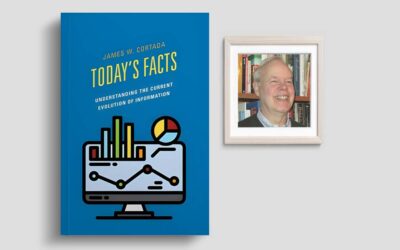Interview with Vardell and Charbonneau, editors of
Health Literacy and Libraries
Lauren Hays
Emily Vardell and Deborah Charbonneau co-edited Health Literacy and Libraries. The book is now available from Rowman & Littlefield.
1. Please introduce yourselves to our readers.
Emily: I recently earned tenure and am now an Associate Professor in the School of Library and Information Management at Emporia State University in Emporia. Kansas. Prior to earning my PhD at UNC Chapel Hill, I was a medical librarian, and I have a passion for helping to develop the next generation of health sciences librarians. I teach courses on the foundations of library science, reference, and health sciences librarianship. My research focuses on health information behavior, especially on how connecting people with information can help improve their health, which is what led me to co-edit our new book on Health Literacy and Libraries. It feels like a great connection between information professions and information to improve community health. I am also very active in the Medical Library Association, which was very helpful when it came time to identify and recruit contributing authors for our book.
Deborah: Currently, I am a Professor in the School of Information Sciences at Wayne State University in Detroit, Michigan. I made the decision to become a faculty member following a career in health sciences libraries. As a health sciences librarian, I worked with library users to locate reliable health information to help individuals make informed healthcare decisions. I observed the difficulties that individuals experienced when attempting to find and use health information. As a result, my interest in pursuing research in the areas of consumer health, health literacy, and implications for libraries flourished. Broadly speaking, my research has explored a number of dimensions around health information access and use. My commitment to addressing health-related issues continues to shape my research interests including programs and practices related to health misinformation in communities.
2. Briefly summarize Health Literacy and Libraries.
Health Literacy and Libraries is a practical and accessible guide for information professionals interested in learning more about health literacy – from its historical foundations to current research on the topic. Our book brings together international experts on health literacy, and we sought to create an engaging resource that provides an authoritative and thorough overview of the topic. This will equip health sciences librarians with the necessary information and tools to be responsive to the varied health information needs and literacy levels of individuals and their communities. The book provides a compilation of relevant research as well as tried-and-true, evidence-based practices for health literacy work in libraries, including instruction, programming, and outreach.
3. Why did you decide to edit this book?
A quote that guides our work in this area comes from the United States (U.S.) Department of Health and Human Services (2008): “the success of health system reform will depend in large part on the capacity of individuals, families, and communities to make informed decisions about their health” (p. 7). Librarians are well positioned to connect individuals with information that will improve their health outcomes. The evidence-based and practical approaches discussed in the book are designed to help build capacity for health literacy work in libraries. We hope the book will assist librarians as they endeavor to combat the proliferation of health misinformation and connect with their communities to improve health outcomes and advance health equity. It seems like now more than ever, there is a real need to connect people with facts and credible information that they can use to make health care decisions. And since there have not been any other books published on this topic, we thought it was time for a book that could bring together multiple experts who could offer diverse viewpoints to create an authoritative and accessible book for librarians working in all types of environments.
4. Why is health literacy an important topic for librarians?
Information professionals are uniquely positioned to advocate for easy-to-read materials as well as design and deliver information literacy instruction to improve health outcomes. We know that access to quality information promotes improved health and supports the health care decision-making process. In light of this, finding ways to connect diverse community members with reliable information is an urgent and continuously developing role for information professionals. This book addresses potential roles for librarians to meet these needs, from public to academic settings with a multitude of different types of patrons.
5. What are two main things you hope all readers take away?
Each chapter presents takeaway messages and discussion questions, which help distill the major points and engage readers in how they might apply the chapters information to inform their own work. We want librarians to learn practical strategies for implementing health literacy work in their own positions and in their communities by showcasing tangible examples throughout the book.
6. Is there anything else you would like to share?
It is our hope that the up-to-date coverage of health literacy in various contexts explored throughout the book will be beneficial to a range of stakeholders interested in health literacy work. This book contains a wealth of insight and brings to light real-life health literacy interventions. We feature chapters on health literacy and specific communities, such as the LGBTQ+, Latinx, and Black communities, written by community members who are also health literacy experts. We also have chapters on specific types of literacy, such as mental health literacy and health insurance literacy, as well as timely applications, such as health misinformation.
References
Department of Health and Human Services. (2008). America’s health literacy: Why we need accessible health information. An Issue Brief From the U.S. Department of Health and Human Services.
Lauren Hays
Interested in learning more about Dr. Lauren Hays’ interviewing secrets? We invite you to attend The Two Sides of Interviewing May 8, 2024 at 11 a.m. Pacific, 2 p.m. Eastern. Reserve your seat in this informative 1-hour webinar.
Never miss another post. Subscribe today!
Similar Posts
The Importance of Professional Networking: Tips for Special Librarians
For many special librarians, the idea of professional networking can feel daunting, especially for those who thrive in quiet, research-driven environments. Lauren Hays shares her journey from reluctant networker to engaged community member, offering practical tips to help you build authentic professional relationships that benefit both you and your field.
Interview with the Author: Jim Cortada on Today’s Facts and the Evolution of Information
Dr. James Cortada, historian and senior research fellow at the Charles Babbage Institute, explores the history of information in his forthcoming book. By examining how information has been created, organized, and used over time, Cortada reveals patterns that continue to shape modern librarianship and knowledge management.
The Complicated Feelings Librarians May Have About AI
GenAI will affect how we do our work and the type(s) of work we engage in. In navigating the transformative potential of GenAI, we should engage in reflective practice that centers on our core professional values.
Recommended AI Literacy Frameworks for Special Librarians
These frameworks provide insights and approaches to help you determine the best ways to address build and promote AI literacy in your specific context.




Leave a Comment
Comments are reviewed and must adhere to our comments policy.
0 Comments